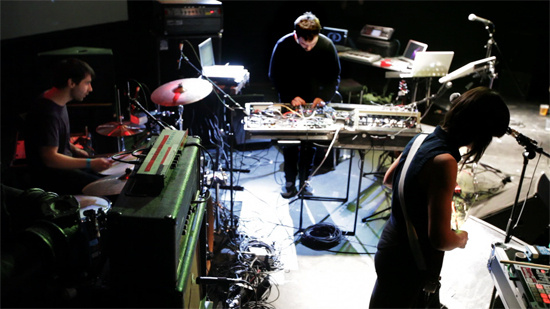Over the past three years, Factory Floor have whittled themselves into one of the most compelling contemporary live acts in Britain, defying predictability in favour of fluidity and spontaneous abandon. Tonight is the first time I’ve seen them since the release of their long awaited and somewhat divisive debut album, and up until now I’ve only ever encountered them in sprawling festival venues; fatigued and propped up on a chipboard rigging cover in 2010, and dancing under darkened arena tents in the shoulders of the UK twice last year.
It’s something that comes to mind whilst sat on the roof of tonight’s venue, Leeds’ Belgrave Music Hall; a new venue on the edge of town that boasts a panoramic view of the city’s glowing skyline from a terrace scattered with local artifacts, including a pilfered yellow ‘Please Slow Down Beacons Festival’ road sign and a smattering of felt tip graffiti. Having slipped out into the cold for a cigarette, I sit shivering inside a painted summerhouse as the trio soundcheck ‘Two Different Ways’ somewhere below. The sound filters out into the night air through a chimney a few metres away, filling the emptiness between fragments of murmured conversations with its familiar swelling opening that reiterates itself over and over. As someone who is yet to hear Factory Floor play within the confines of an indoor space, it’s intriguing to hear them in such undiluted form; literally being pumped into the air, curling out from a four foot brick funnel as if it were a speaker, the clattering of drums, woodblock taps and white noise oozing out onto the terrace, an unapologetic guest that permeates each shadowy corner. It continues to pound through the walls as I head back downstairs, and at the bar the sound persists overhead, battering on obstinately beyond the ceiling, interrupting thoughts and drowning out the low level clink of glasses and raspy rattles of e-cigarettes below.
When Factory Floor play an hour and a half later, you can almost physically feel the music trying to escape the venue, viscerally obliterating anything and everything that stands in its way. Nik Void’s heavily reverbed vocals rise up towards the vent that leads to the sky, whilst juddering sequences ricochet through your entire body before hitting the floor beneath the feet, turning you into a sort of inadvertent human lightening rod. It’s perhaps what’s rooting everyone to the ground tonight; the crowd are static and scattered, the majority standing solemnly with looks of intent concentration upon their faces as they watch Gabe Gurnsey pelt his drum kit with vehemence. All clothes stay firmly put, and other than a mild threat of whiplash for a small minority on the front row, there’s an air of stagnancy about the place. At one point Gurnsey wanders off through the red spotlights and dry ice, leaving the other two to take over before Void too abandons her position to hang off the steps at the side of the stage and Dominic Butler is left alone to stretch out his concentric synth loops into a never faltering impromptu solo.
The moment underlines the notion of endless possibility that pervades the group’s live setup; a feeling that you could see a hundred shows and no two would ever quite be the same; a feeling that somehow, even if you were to mount the stage and begin tearing wires from machines, they could never be halted. Even when the seemingly infinite rumbles cease, even after the trio exit with a curt wave and the speakers lull and fade, there’s still an echo of something between your ears, muffling your acquaintances’ debriefing as you walk home with the taste of metal in your mouth, swirling around your mind long after you’ve gone to bed. It’s hard to put a finger on it; the secret to Factory Floor’s exceptional live temperament isn’t something palpable, despite it leaving its dirty fingerprints all over you. It’s something that cannot be contained within bricks and mortar, something that can render you motionless or have you bouncing off the walls, regardless of will or intent. It’s rampant, unrelenting and impenetrable, yet simultaneously exhausting, nuanced and brittle. It’s certainly more than enough to drown out any acrimonious Guardian comments or ignorant chuckles of, "but why do they always look so bloody miserable?"


